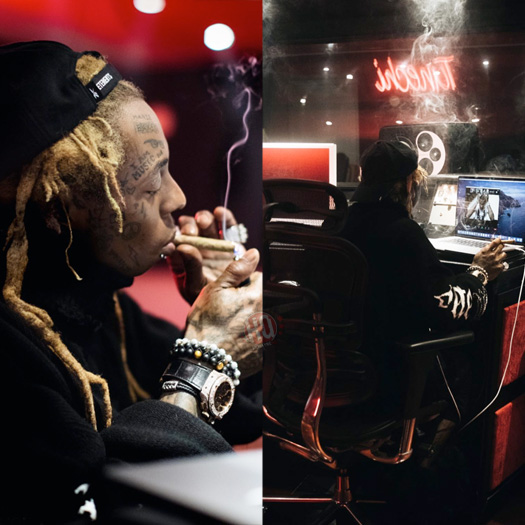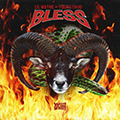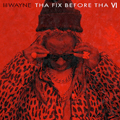
In an interview with Rolling Stone for their Musicians On Musicians feature, Lil Wayne and Lil Baby chopped it up together over Zoom.
During their convo, Weezy and Baby discussed when they first heard each other’s music, how their hometowns shaped them, the first albums that made a big impact on them, how they approach songs, their influences outside of rap music, where they get their work ethic from, their looks, and much more.
Tunechi also confirmed that he has a new collaboration with Lil Baby on No Ceilings 3 mixtape (presumably on Side B). You can watch the two of them chat with Dewayne Gage and read their full interesting conversation after the jump below!
Wayne doesn’t listen to a lot of new music — “I listen to myself,” he’s said — but he loves Lil Baby, the 25-year-old Atlanta rapper who, in just a few years, has gone from serving time to becoming one of rap’s most urgent voices. Wayne points to Baby’s lyrics, which combine politically conscious statements with playful wordplay (“I done made a quarter this week in huaraches/Top model with me, trying to feed me hibachi”), delivered in some of rap’s smoothest cadences. “I got the utmost respect for his shit,” says Wayne, alluding to Baby’s protest anthem “The Bigger Picture.” (This interview took place before Wayne’s controversial choice to pose for a photograph with President Trump just days before the election.)
Baby was in his early teens when Wayne reshaped rap with his mixtape series No Ceilings and the multiplatinum Tha Carter III. Baby likes how Wayne was able to balance huge radio hits with wild creative choices (including his 2010 rock album, The Rebirth.) “I always felt like Wayne did what he wanted to do,” says Baby. “The reason was because he put the numbers up behind it. So that’s how I am rocking out: doing whatever I want, as long as I put them numbers up.”
Baby: I heard you real young. I can’t even remember, maybe elementary or middle school. I can’t even remember, like, the first time I heard a Lil Wayne song, but I knew them fucking word for word back then.
Wayne: I appreciate that. I remember I saw the video “Drip Too Hard.” Of course, that was riding a wave where a lot of music was sounding the same. I’m like, “Who this?” Reginae [Wayne’s daughter] was like, “That’s what I’m talking about.” So once it got solidified, I was a fan forever.
Wayne, you’re from New Orleans, Baby’s from Atlanta. How did those cities shape you?
Baby: It shaped me a whole lot, ’cause that’s my swag, my flavor, my flow. That’s my talk, my walk, right there. I feel like where you come from is 90 percent you.
Wayne: New Orleans is the reason why I am a rapper, bro, plain and simple. My oldest son, he’s doing an assignment for school right now, and he asked me this week: “Dad, I have to do an assignment on you. Can I ask you a few questions? What rappers influenced you?” My answer was: “I’m sorry. I can’t. Your teachers, your friends, they’re not gonna know who they are.”
Growing up, we had block parties very frequently. And they were almost like a concert, but the mic was always open. So those regular guys who rocked every block party, they were superstars. I mean, [they had] no cars or jewelry, no nothing. But [they] will be on it and rocked the DJ. So I saw that. I saw him poppin’, I wanted all that. So one day, I got hyped up off of some Mountain Dew; I was just 11 years old. I walked up to the DJ, and that’s it: “Let me see the mic.”
When I jumped in the game, [the South] was frowned upon, you know: “There go them boys with their shake-that-ass music.” Nah, man, we talking about something! I heard something come on the radio, and I got to ask Mack [Maine], “Who that is?” And when he tell me where they from, I’m like, “Nah, they can’t be from New York.” But you know, it’s flattery.
What was one of the first albums that impacted you?
Wayne: Jay-Z, Life and Times of Shawn Carter, plain and simple. It was the first album where I actually [got] the car that the rapper was talking about. That was my album. Also, Jay talked so crazy. He went bananas on that album. I got lyrics from the album tattooed on me and shit. I have songs that are remakes of spinoffs of songs from that album, you know?
Baby: I can’t remember. I was always rapping, remixing peoples songs, switching the words up. My whole process when I walk in the booth is go hard. I’m not even thinking. I’m just thinking, like, “Go hard as I can go on this beat.”
Wayne: I approach it a bit different. I want to know who the song is for and what’s the song about, and after that, I go back into Lil Baby mode: I just go in there and kill it. The trait that’s gotten me to where I’m at right now is that I’ve always tried to impress. So whoever gives me a song, that’s my main thing. When I send it back, I want that person to be impressed, and be more than satisfied with what they just got back. I just be aiming to please, man.
You both have very melodic styles. What are your influences outside of rap music?
Wayne: The first is gonna be Miss Anita Baker, then Missy Elliott. Miss Erykah Badu. Then I might flip it around: Smashing Pumpkins, Nirvana. Nine Inch Nails. 311. Stuff like that. I make sure I hear what everybody makes, just to make sure that we all still going through the same battles. I listen to everybody.
Baby: I like anything that got a vibe. It’s gotta be R&B, soul music, shit you feel.
Wayne: I’m gonna shoot you some joints, let you listen to them.
Baby: Staying focused [is a big challenge]. Staying focused now that I got a lot to lose. Nowadays a lot of people depend on me. It’s a hard challenge for me, with all the distractions and shit. So that’s like the main thing to me, managing my money the right way.
Wayne: The most challenging challenge for me would be trying to be the most perfect — if there is a such thing — father there is to my three boys and my beautiful daughter. I love a challenge.
Everybody has stories about you, Wayne, how you’re in the studio forever and work like crazy.
Wayne: I got it straight from [Cash Money founders] Birdman and Ronald “Slim” Williams. And Mannie Fresh. That’s what they embedded in us. They went to the studio Monday through Sunday. They put in my head that you must work, no matter what. I was still in school. I was 13, 14, and they had no problem with knowing that I had exams or whatever: “You need to be in the studio. We need that verse.” So it was embedded.
Baby: On my end, I think it comes from just hustle and the grind, period. Whole thing is like, if you’re hustling, we go hard. In the studio, it’s the same thing. For me it’s the outcome: We do this shit right, we can go on the road and get all this money; we can buy something.
Rappers don’t get recognized for being style icons and shaping the culture that way. How did you put together your looks?
Wayne: It was always just wanting to be different. I started in the group the Hot Boys. Baby started throwing on these throwback jerseys. That’s what opened up the door for me to give a little bit more personality. We had a uniform at Cash Money. I always want to just go left and make myself stand out.
My mom was a single parent. She would break my fucking back just to make sure I’m fly, just to make sure I’m funky, so that’s where I get that from. Even when she was asking me to walk to the corner store to get a Coke and some chips — you better not go to that store in the shit you slept in. I’m that way with my sons.
Baby: I already knew what I wanted, but didn’t always have a bankroll to do it. I started getting the money, and that’s all I need.
Wayne: That’s what it is, right there.
Your productions are on another level. Tell me about the process of beat selection.
Baby: I want to take them from producers, the beat that we going crazy on.
Wayne: Like he said, all credit due to the producers, plain and simple. If you love that music, then that’s all them. I don’t have no part in the music.
How do you select tracks when putting together an album? Is it a collective process?
Wayne: Mack, plain and simple. I just throw them all out down on the table and let him pull his hair out, even though he’s got no hair. I just gave him, like, 90 songs when all he actually needed was two. [Laughs.] He just lets me know what he picked. I mean, that right there comes from just having confidence in every single thing I do. And thinking every single song I do is worthy of being the Number One song in the damn country, so therefore I never get pissed about none of the songs he didn’t pick. The ones he didn’t pick, those are the best ones, too. [I] put them on mixtapes.
Baby: Once I play music for the bros, they’ll tell me to “play that one back” or “I want to hear that one.” I kind of already can feel it. My people around me, they can let me know: “Put a little snippet on Instagram” or something I kind of work off of trying to go off everybody else.
Wayne: I remember those days. Now I go into the studio by myself. I don’t like niggas to be around my shit. I don’t got nobody to pop their head, tell me it’s fire or something. I just go off. Other than that is just feeling, man. I start making some shit up in my head. I can give y’all an exclusive that me and Baby got one together on No Ceilings 3.
Do you think Wayne gets enough credit?
Baby: What I’m learning about the rap game is you ain’t never going to get enough credit. Might get it from some people, but for the most part, you’ll never get no credit.
Wayne: I can’t do nothing but say amen to that. I can’t do nothing but say amen.





